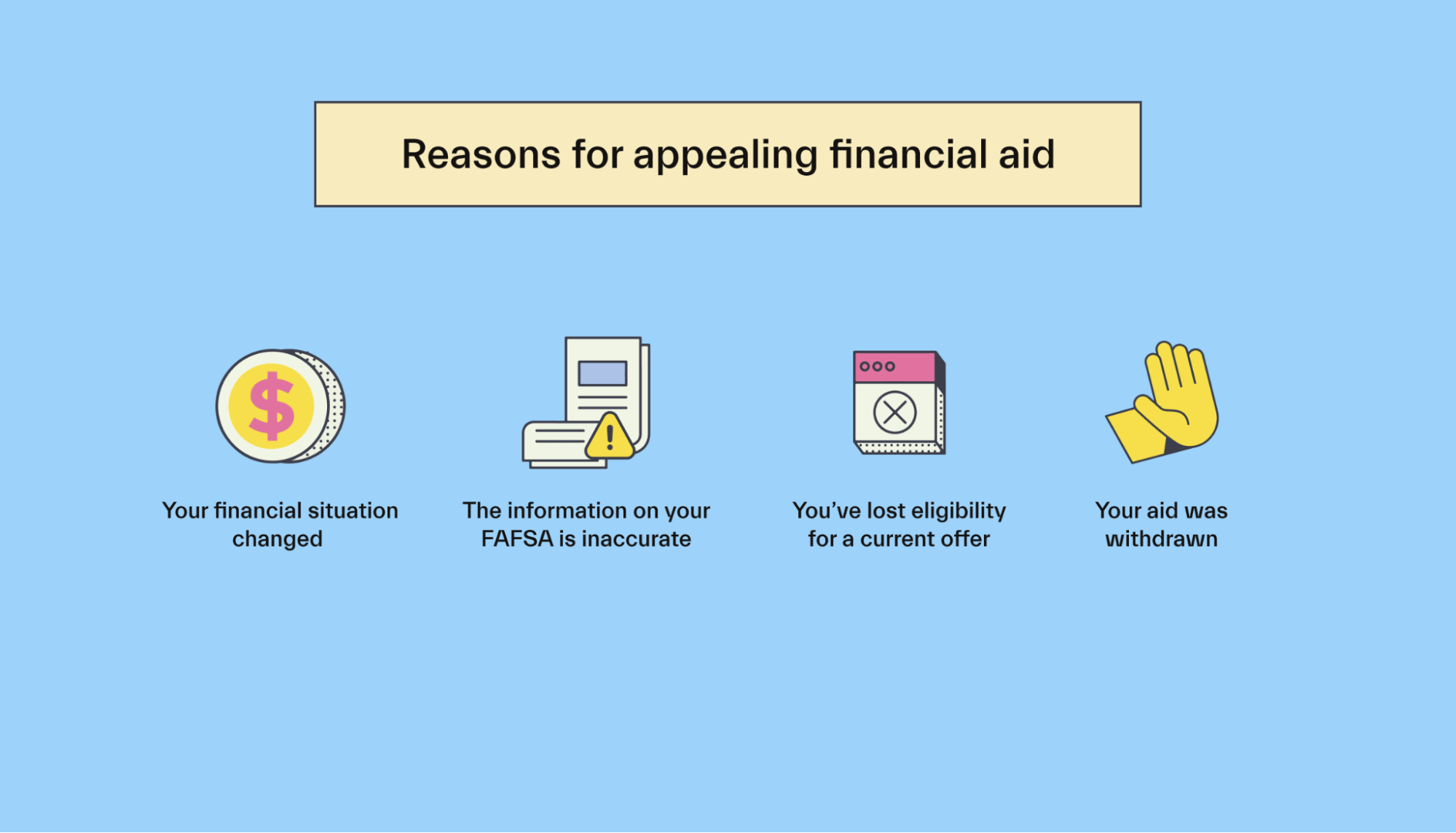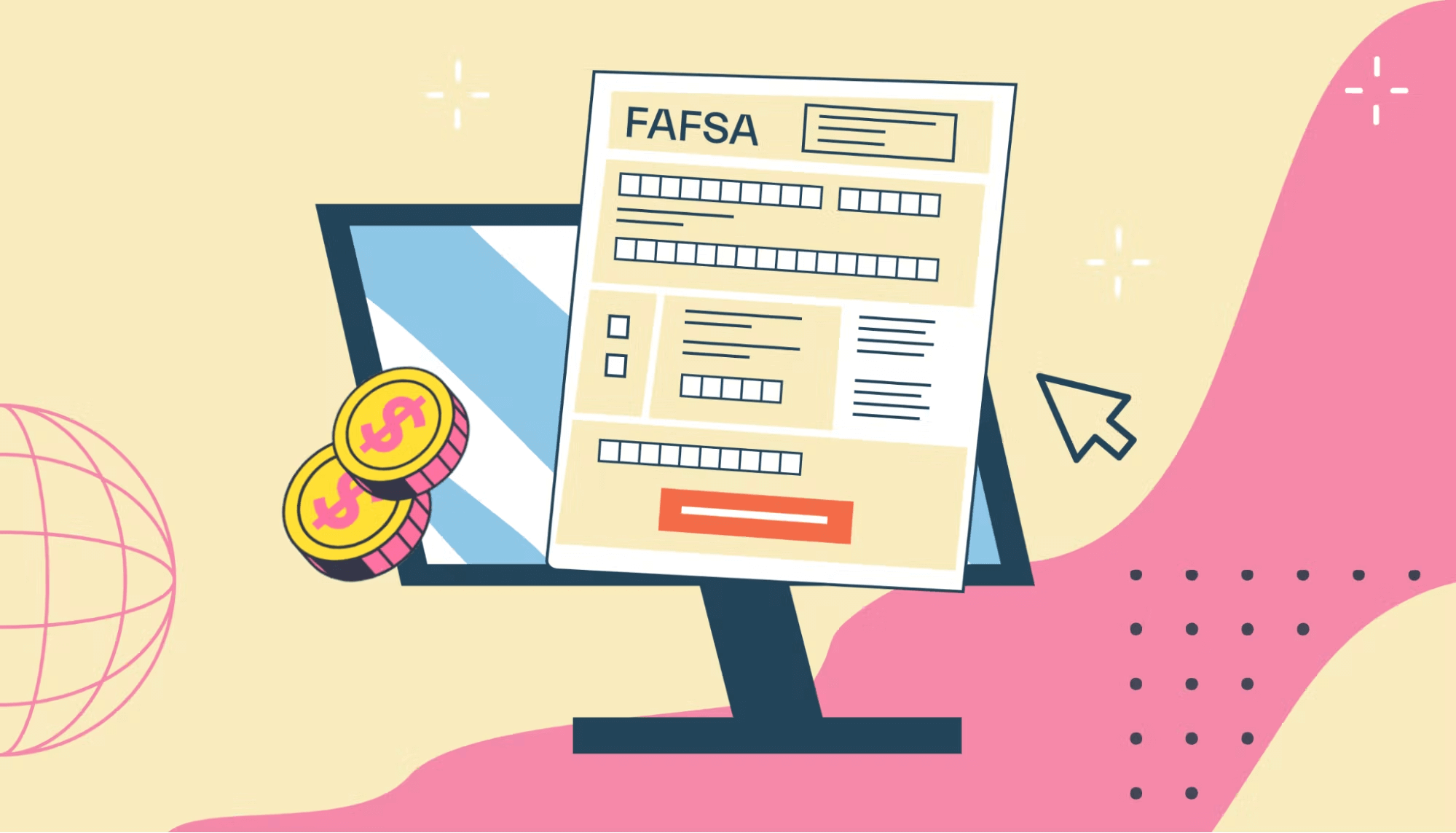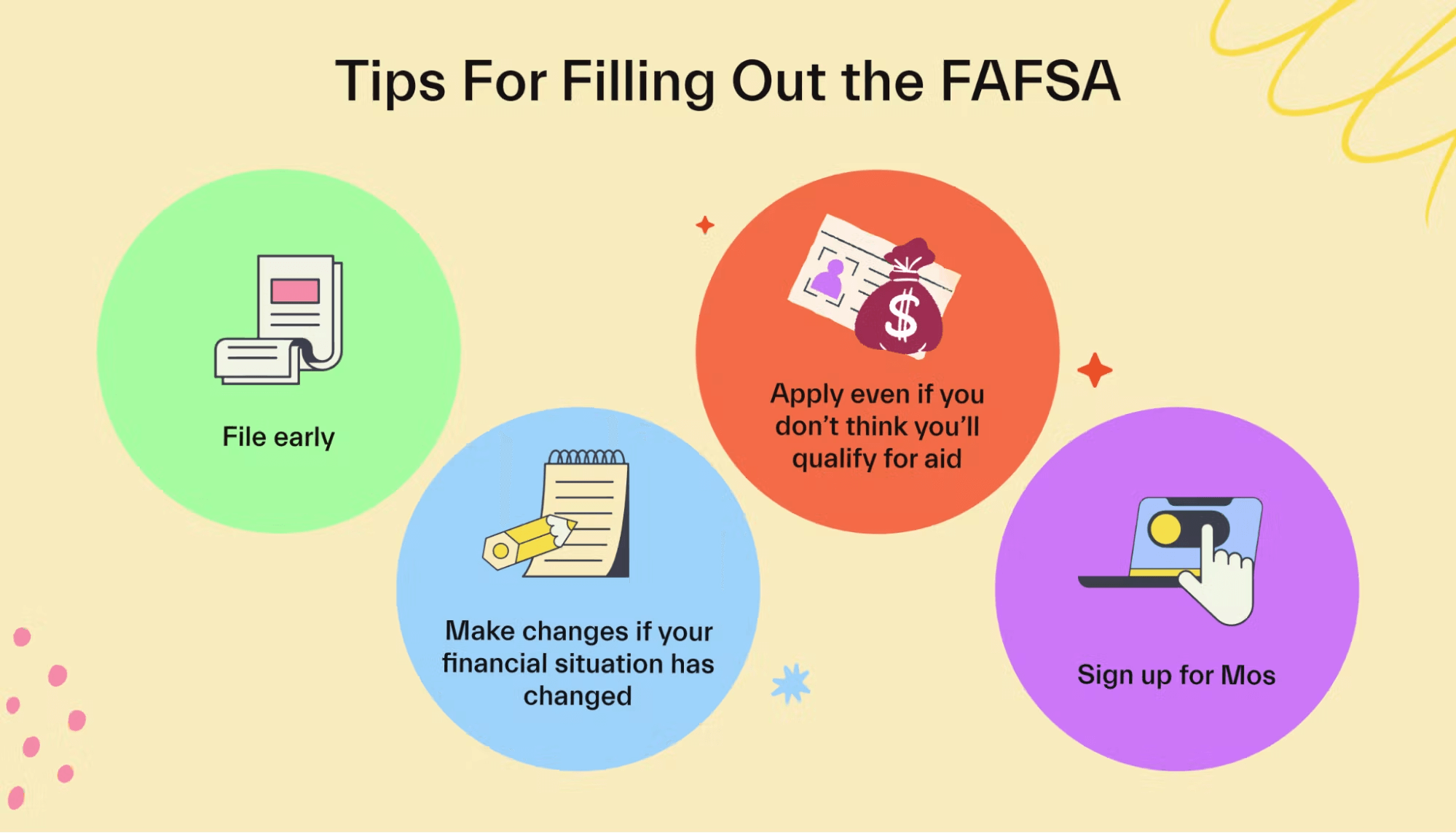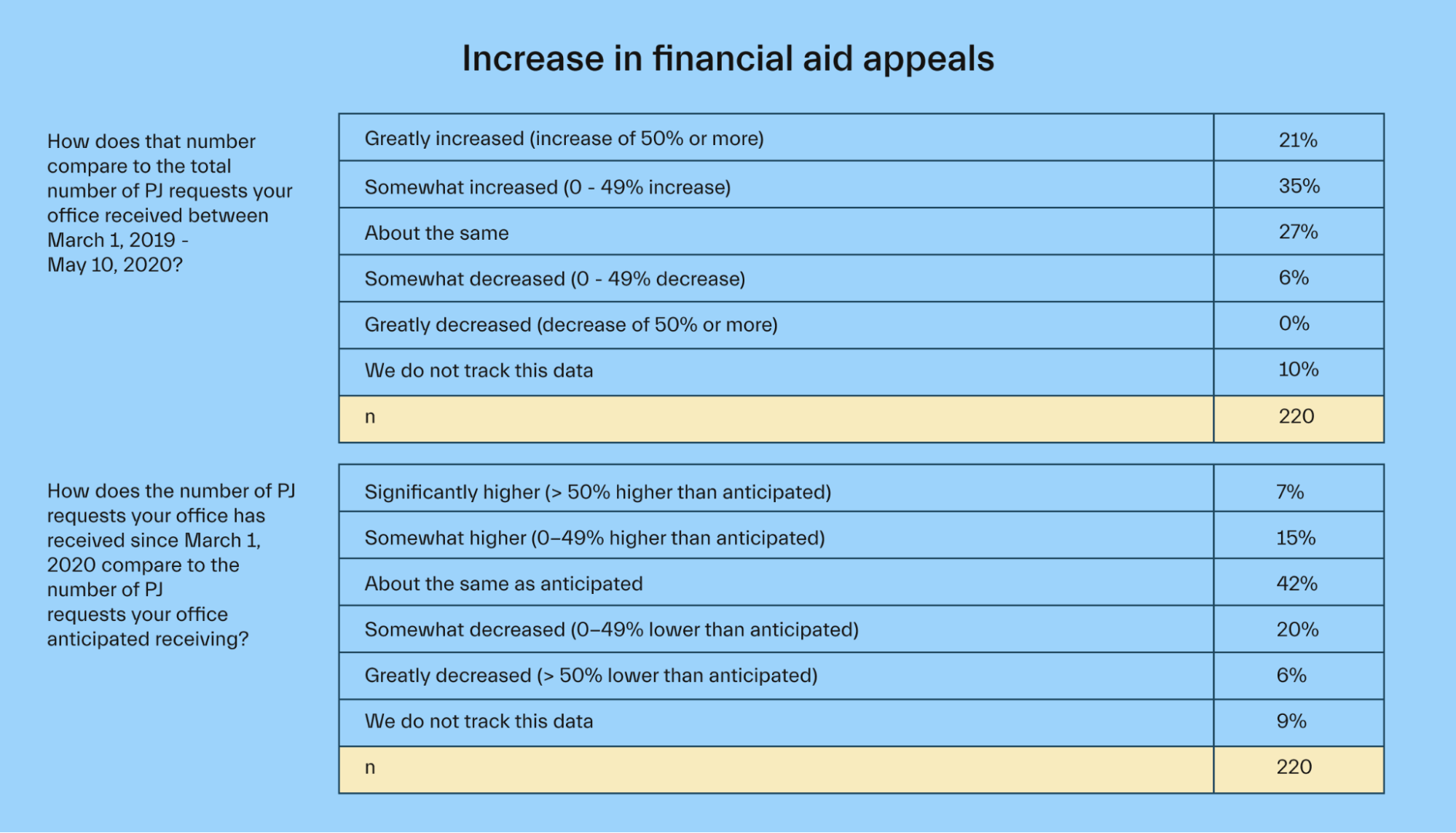Financial aid •
Sample letter of extenuating circumstances for financial aid
Our guide to writing a sample letter of extenuating circumstances for financial aid.

There aren’t many students out there who can afford to pay for college without financial aid. In fact, a whopping 86% of college students rely on some form of financial aid to support them through college.
Regardless, these grants, scholarships, and loan opportunities simply aren’t enough to help students bridge that financial gap.
Want some good news? If you’re not offered enough financial aid to pursue your studies, you can usually make an appeal.
By launching an appeal for more financial aid, you might convince the financial aid office at your school to reexamine your circumstances—and potentially offer you extra cash as a result.
This appeals process normally starts by writing a letter of extenuating circumstances.
This guide explains when you should appeal for more financial aid and what to include in a letter of extenuating circumstances. We’ll also walk you through a sample letter of extenuating circumstances so you know exactly how to craft yours.
8 reasons for appealing financial aid
Believe it or not, the teams that manage most financial aid offices at US colleges are pretty understanding and willing to listen. If you genuinely need a higher amount of financial aid to afford school, it’s possible to get help.
However, you can’t just call up your school’s financial aid office and beg for another scholarship because you’ve blown your tuition money on spring break.
If you want to successfully appeal your financial aid offer, you need to have a good reason—and although each student has their own unique economic situation, there are 4 main reasons you may want to consider launching a financial aid appeal.

1. Your financial situation changed
The first reason you might find yourself in a situation in which you’re going to want to appeal your financial aid offer is that your financial situation has changed.
The scope for this appeal strategy is pretty broad—meaning that there can be many different types of changes that could impact your ability to pay for school.
For example, perhaps your mom has lost her job, or she’s had to take a new job that pays much lower than her previous one—and she’s the sole source of income for your family.
Let’s say you’ve included her old salary information as part of your Free Application for Federal Student Aid (FAFSA). That means your financial aid office has come up with an aid offer based on outdated information.
Because your parent is now earning way less money, you may now qualify for a higher grant or a different scholarship award because your financial need has increased.
The same rule applies to an extenuating circumstance like an unexpected healthcare issue that you’ve had to pay for out-of-pocket. It can also apply to dental expenses that are not covered by insurance.
Likewise, if your parents have recently divorced, it’s possible this big family change has had a negative impact on the amount of money you’ve got to pay for school.
These are all situations that finance teams generally listen to with a lot of empathy, and they could lead to a new assessment of how much aid you’ve been offered.
2. The information on your FAFSA is inaccurate
The second reason you may need to launch a financial aid appeal is that the income you listed on your FAFSA simply isn’t accurate.

This inaccuracy could boil down to a drastic change in your personal finances (which we’ve already covered). But your FAFSA could also be wrong because you accidentally made a simple error.
For example, maybe your FAFSA didn’t allow you enough space to fully demonstrate how a large portion of your family income is needed to cover existing debts—or you might have just filled in the wrong number in the wrong box.
Don’t stress—accidents happen. You just need to clearly explain the problem and be able to provide accurate information to fix the mistake.
3. You’ve lost eligibility for a current offer
The third reason you might launch a financial aid appeal is that you've lost eligibility for an existing offer. A lot of colleges offer scholarships or grants based on the requirement that you have a certain GPA throughout your time at the school.
But if you’ve experienced a dramatic life event that impacted your grades and your financial aid was revoked, you might be able to launch a successful financial appeal.
Examples include pregnancy, a new illness, bereavement, or ending up homeless.
In some cases, your school will consider these events and overturn your loss of financial aid on compassionate grounds.
In order to qualify, you’ll need to file a Satisfactory Academic Progress (SAP) appeal.
4. Your aid was withdrawn
The fourth reason schools will often consider your financial aid appeal is because your existing aid has been withdrawn.
For example, perhaps you’ve been awarded a grant by your school, but the grant scheme gets pulled before you’re able to get the full amount you were originally expecting.
You should be able to appeal this loss of income—and, hopefully, get matched with a replacement grant or scholarship.
No matter your reason, the bottom line is this: if you haven’t been offered decent enough financial support to pay for your tuition, it’s always worth appealing. After all, those who don’t ask don’t get.
5. The size of your family has changed
If your family grows or shrinks through the birth or adoption of a child or the death of a parent or guardian, you should reach out to your school to let them know. A large portion of your family’s expected family contribution to the cost of college can be impacted by your household size, so a change could make you eligible for more aid.
It is helpful to have documentation showing how and when your household size changed, so have adoption paperwork, a death certificate, or other supporting evidence handy when you submit this request.
6. A natural disaster or another emergency has impacted your family
If your family lives in an area impacted by a natural disaster, such as a hurricane or major flood, you should communicate this to your financial aid office. This event likely had a major impact on your family’s financial situation, and, depending on the damage, it could have affected your living situation as well.

You might be able to get additional aid from your school, as well as more flexibility when it comes to things like move-in and move-out dates for your dormitory or other forms of assistance.
Some schools also have financial support available to people who are dealing with the fallout from the Covid-19 pandemic, so if your family has been impacted by that, let your financial aid office know.
7. You have a new or newly diagnosed medical condition
If you’ve been diagnosed with a medical or mental health condition, you may be eligible for additional financial aid. Depending on the nature of the condition, you might also want to reach out to your school’s disability resource center for additional support with things like taking notes or handling assignments.
When you send your letter of extenuating circumstances to your financial aid office, provide details about your condition and how it impacts your need for financial aid. Have medical documentation—preferably on official letterhead—from a healthcare provider to show the school.
8. You have a sibling in an elementary or secondary school that charges tuition
The federal government specifically notes that paying private elementary and secondary school tuition is a special circumstance that could impact your financial need and reduce your expected family contribution to the cost of college.
If you have a sibling or family member attending a private elementary or secondary school, let your financial aid office know after you submit the FAFSA. Provide supporting documentation to show how much the tuition costs. Some colleges may treat these expenses as a reduction in income and increase your need-based financial aid accordingly.
What is a letter of extenuating circumstances for financial aid?
The COVID-19 pandemic has impacted some family incomes over the past couple of years. As a result, colleges are currently accepting more financial aid appeals than ever before.
According to a new survey from the National Association of Student Financial Aid Administrators (NASFAA), more than half of colleges reported an increase in the number of “professional judgment requests” in 2020.
A professional judgment request is just a fancy way of describing a third-party reexamination of a student’s FAFSA offer.

But it’s one thing to convince a university to reexamine your financial aid offer. Actually securing a better financial aid package is a whole different ball game.
That’s why any successful financial aid appeal must begin with a well-written and organized letter of extenuating circumstances.
A letter of extenuating circumstances sounds complicated, but it’s really just an official request for help.
The letter needs to clearly explain the problem and the current status of your financial award.
Then, it needs to demonstrate why your existing financial aid offer simply isn’t enough to support your studies.

Before you sit down and write a letter of extenuating circumstances for financial aid, you should get in touch with your financial aid office. They’ll be able to tell you who to send the letter to and if it should be delivered virtually or physically.
You should also ask your financial aid office if the school has a particular appeals process and if there’s anything in particular you need to know before appealing for more aid.
For example, your college might have a specific appeal form you’ll need to complete and submit alongside your letter of extenuating circumstances.
It’s also important to note that you’ll normally be expected to submit any supporting documentation relevant to your letter. Always provide evidence to support your appeal.
What to include in a letter of extenuating circumstances for financial aid
If you’ve never made an appeal for extra financial aid, it can be a little bit daunting trying to write a letter of extenuating circumstances for the first time.
To help you get started, we’ll take a look at all of the stuff you should include in your letter.

A personal address
Most financial aid offices will have an appointed team member responsible for handling financial aid appeals. Address your letter to that person—not “to whom it may concern.”
By addressing your letter to that individual in particular, you’ll demonstrate that you’ve done your research, understand the school’s protocol, and you’re taking this matter seriously.
A specific reason
Remember: your college wants to help you. But if you don’t explain exactly why you need more cash to pay for college, they probably won’t consider your appeal. You must be specific.
A letter of extenuating circumstances is your place to explain why you’re asking for help.
Detail what’s happened with your parent’s career, describe ongoing medical conditions, or discuss any other specific reason you’re finding it hard to pay for college.
Documentation
Your appeal probably won’t be considered if you can’t provide proof of your financial need.
After explaining the specific reason you require extra aid, you should include all of the appropriate documentation alongside your letter to prove your claims are true.
For example, if you’ve had an unexpected medical emergency that’s drained your life savings, a hospital invoice or letter from your health insurance company will be able to demonstrate the story in your letter is real.
A specific request
Your letter will be a lot more effective if you request a specific amount of money.

After explaining your financial problem, include some basic math and show the person reading exactly how much money you need to make up the difference. This could be to pay for tuition, travel costs, housing, or anything in between.
Explain what you can’t afford and how much more you need.
Likewise, a letter of extenuating circumstances is also a good place to outline any competing offers of financial aid you might have from other schools. If one college has offered you a bigger scholarship than another, write to your other schools asking them to match it.
Questions about the next steps
You should always close your letter by asking for details about the next step in the appeals process.
Ideally, you’ll already have contacted your school’s financial aid office to figure out what those steps are, but by asking about the next step in your letter, you’re prompting the recipient to write you a response.
Gratitude
Above all else, your letter should be polite and show how thankful you are that you were offered anything at all.
Remember: your letter is a request for help. Nobody is going to want to help you if you write them an angry letter ranting about how unfair life is or how greedy you think the school looks.
By showing a bit of humility in your letter, the person reading it’ll be more inclined to show you kindness in return.

Sample letter of extenuating circumstances for financial aid
If you need a hand getting started writing a financial aid appeal letter, don’t worry.
Here’s an example of a sample letter of extenuating circumstances for financial aid we’ve written that you can use as a template:
Dear Ms. Xxxxxxx,
I am an incoming freshman student planning to attend the University of College in the fall.
I would like to thank you for the financial aid package the university has offered. Unfortunately, my family’s financial situation has changed significantly since submitting my FAFSA.
Prior to receiving my financial award letter, my father developed a chronic illness and has had to reduce his work hours dramatically. Meanwhile, our family is now facing significant medical bills of approximately $20,000.
Bearing in mind my father earned over half of our household income, our family no longer has sufficient funds to cover the cost of outstanding tuition and living expenses. We are now currently facing a shortfall of $5,750 per semester.
I sincerely want to continue with my plans to study at the University of College this fall. That is why I am requesting the university review my award in relation to my change in financial circumstances.
Enclosed, you will find supporting documentation, including my father’s medical diagnosis, payslips demonstrating his reduced hours, and evidence of monthly medical expenses. I have also attached a completed copy of the University of College’s financial aid appeal form.
If you have any questions or require any additional information about this appeal, please don’t hesitate to get in touch. Thank you in advance for reviewing my appeal.
Sincerely
College Student
Student number: 123456789
Conclusion
At the end of the day, those who don’t ask don’t get.
If you or your family have experienced serious financial difficulties, it’s always worth appealing to your school for more financial aid—and the best way to make it happen is by submitting a letter of extenuating circumstances to your college’s finance office.
When it comes to writing your letter, there are plenty of sample letters out there, so try not to stress. Take your time, be sincere, and don’t be afraid to ask for help writing your letter or collating supporting documentation to help your appeal.
Join Mos now, and we can match you with loads of scholarships and other financial aid opportunities to help you make the most of your time in college!
To learn more about college financial aid, check out our article Financial Aid FAQs.
Let's get
your money
- Get paired with a financial aid expert
- Get more money for school
- Get more time to do you








